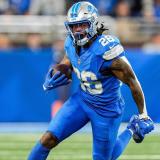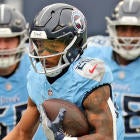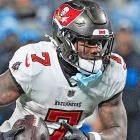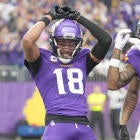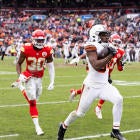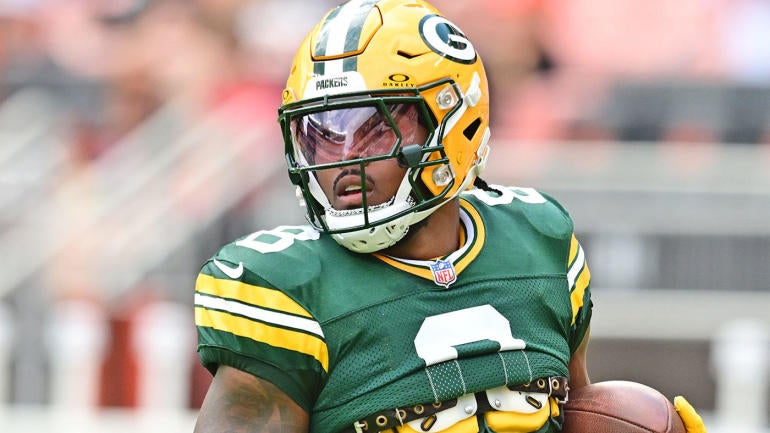
Do you prefer hunting for running backs all season long, or loading up on the position on Draft Day with the hope that you don't have to chase them?
It's a trick question.
If you're worth your salt as a Fantasy manager, you're always going to be on the lookout for running backs off the waiver wire (and in trade) all season regardless of who you draft. That's even if you're one of the very lucky ones who don't have to replace an injured or underperforming running back during the year.
So if you're chasing running backs all year in all ways possible, you might as well not over-prioritize the position on Draft Day.
I think one thing you should count on is a majority of your league taking one running back with their first two picks. Almost everyone will begin their draft with one receiver and one running back. That's because more and more people are gravitating toward taking the elite-level wide receivers earlier than ever (especially in PPR -- they score more and aren't as fragile). Taking one of each, usually with the receiver first, offers flexibility for your next few picks and balance for how you build your roster.
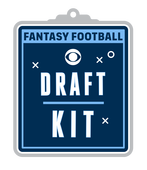
Fantasy Football Draft Kit
Your ultimate football draft guide
Dominate your Fantasy Football draft with our free printable Draft Kit, which gives you must-have top-200 rankings for PPR, half-PPR and non-PPR leagues, plus see the top ranked players at every position. Get average draft position data for every ranked player to help strategize before Draft Day, and keep track of your roster with our lineup builder for both snake and salary cap formats.
Thanks for signing up!
Keep an eye on your inbox.
Sorry!
There was an error processing your subscription.
Does this mean the Hero-RB strategy (one RB with your first four or more picks) is the right approach? No. It's going to be popular, but I wouldn't overlook another running back slipping into Round 2 or 3 and becoming a value pick for your roster.
So then Heavy-RB (two RBs with your first two or three picks) is still reasonable? It is if the value matches up. You will see at least two managers in every draft take two running backs with their first three picks, and it might even be with their first two picks. I wouldn't blame them for it if there weren't wide receivers they valued when they were up in the early rounds.
Then is the Zero-RB strategy worthless? No way. You should be thrilled if you can get two elite-tier receivers with your first two picks and then follow it up with excellent values at non-RB positions with your next two picks. There will be running back values in Round 5 and beyond -- but you have to be OK with the realization that you won't begin the season with consistent stat producers.
The keyword in all three of those answers? VALUE. That's the name of the game in Fantasy drafts, regardless of position. You should never pass up a value, a bargain, or a steal.
That's why it doesn't make sense to commit to one of the three common running back strategies before your draft. You should know about them and be open to all three of them, and maybe prefer one of them to the others, but let the draft dictate which path you take.
Regardless of these scenarios, I still think it's worth it to finish your draft with as many as seven running backs on your squad. Take as many shots as you can on runners who can become starters. You'd rather begin the year with them on your team than the waiver wire.
Pre-draft homework:
* Do receptions count for a full point? If they don't then you should prioritize running backs immediately. You could do the same in half-point PPR, too.
* Figure out where the elite running backs end in your mind and the startable-but-not-as-good running backs begin. For me, Tier 4 is where the first big drop-off is, then another at Tier 6 in PPR, Lottery Tickets in non-PPR. You're going to want running backs before these tiers run out ... unless you don't because you love Zero-RB.
* Take some time to target three or four late-round running backs. Look for guys in strong offenses who have an older runner in front of them, or an unproven runner in front of them. Some of my faves: Ty Chandler, Jordan Mason, Tyrone Tracy Jr., Trey Benson and Ray Davis.
Dave's Tiers updated through Aug. 30: QB | RB | WR | TE | K/DST
Running back PPR tiers
B. Hall
NYJ
Breece Hall
NYJ
|
B. Robinson
ATL
Bijan Robinson
ATL
|
J. Taylor
IND
Jonathan Taylor
IND
|
S. Barkley
PHI
Saquon Barkley
PHI
|
J. Gibbs
DET
Jahmyr Gibbs
DET
|
K. Williams
LAR
Kyren Williams
LAR
|
I. Pacheco
KC
Isiah Pacheco
KC
|
T. Etienne
JAC
Travis Etienne
JAC
|
D. Henry
BAL
Derrick Henry
BAL
|
J. Jacobs
GB
Josh Jacobs
GB
|
R. White
TB
Rachaad White
TB
|
J. Cook
BUF
James Cook
BUF
|
K. Walker III
SEA
Kenneth Walker III
SEA
|
A. Kamara
NO
Alvin Kamara
NO
|
D. Achane
MIA
De'Von Achane
MIA
|
J. Conner
ARI
James Conner
ARI
|
D. Montgomery
DET
David Montgomery
DET
|
Z. White
LV
Zamir White
LV
|
N. Harris
PIT
Najee Harris
PIT
|
J. Williams
DEN
Javonte Williams
DEN
|
B. Robinson Jr.
WAS
Brian Robinson Jr.
WAS
|
A. Jones
MIN
Aaron Jones
MIN
|
T. Pollard
TEN
Tony Pollard
TEN
|
D. Swift
CHI
D'Andre Swift
CHI
|
R. Mostert
MIA
Raheem Mostert
MIA
|
C. Brown
CIN
Chase Brown
CIN
|
T. Spears
TEN
Tyjae Spears
TEN
|
J. Warren
PIT
Jaylen Warren
PIT
|
J. Brooks
CAR
Jonathon Brooks
CAR
|
D. Singletary
NYG
Devin Singletary
NYG
|
G. Edwards
LAC
Gus Edwards
LAC
|
C. Hubbard
CAR
Chuba Hubbard
CAR
|
R. Dowdle
DAL
Rico Dowdle
DAL
|
N. Chubb
CLE
Nick Chubb
CLE
|
J. Ford
CLE
Jerome Ford
CLE
|
T. Chandler
MIN
Ty Chandler
MIN
|
A. Ekeler
WAS
Austin Ekeler
WAS
|
J. Dobbins
LAC
J.K. Dobbins
LAC
|
E. Elliott
DAL
Ezekiel Elliott
DAL
|
J. Mason
SF
Jordan Mason
SF
|
J. McLaughlin
DEN
Jaleel McLaughlin
DEN
|
B. Corum
LAR
Blake Corum
LAR
|
T. Tracy Jr.
NYG
Tyrone Tracy Jr.
NYG
|
T. Benson
ARI
Trey Benson
ARI
|
B. Irving
TB
Bucky Irving
TB
|
J. Wright
MIA
Jaylen Wright
MIA
|
M. Lloyd
GB
MarShawn Lloyd
GB
|
Z. Charbonnet
SEA
Zach Charbonnet
SEA
|
K. Vidal
LAC
Kimani Vidal
LAC
|
D. Cook
DAL
Dalvin Cook
DAL
|
T. Bigsby
JAC
Tank Bigsby
JAC
|
C. Steele
KC
Carson Steele
KC
|
A. Estime
DEN
Audric Estime
DEN
|
Running back non-PPR tiers
B. Hall
NYJ
Breece Hall
NYJ
|
B. Robinson
ATL
Bijan Robinson
ATL
|
J. Taylor
IND
Jonathan Taylor
IND
|
S. Barkley
PHI
Saquon Barkley
PHI
|
J. Gibbs
DET
Jahmyr Gibbs
DET
|
K. Williams
LAR
Kyren Williams
LAR
|
D. Henry
BAL
Derrick Henry
BAL
|
I. Pacheco
KC
Isiah Pacheco
KC
|
T. Etienne
JAC
Travis Etienne
JAC
|
J. Jacobs
GB
Josh Jacobs
GB
|
R. White
TB
Rachaad White
TB
|
J. Cook
BUF
James Cook
BUF
|
K. Walker III
SEA
Kenneth Walker III
SEA
|
D. Achane
MIA
De'Von Achane
MIA
|
A. Kamara
NO
Alvin Kamara
NO
|
D. Montgomery
DET
David Montgomery
DET
|
J. Conner
ARI
James Conner
ARI
|
Z. White
LV
Zamir White
LV
|
N. Harris
PIT
Najee Harris
PIT
|
J. Williams
DEN
Javonte Williams
DEN
|
B. Robinson Jr.
WAS
Brian Robinson Jr.
WAS
|
A. Jones
MIN
Aaron Jones
MIN
|
T. Pollard
TEN
Tony Pollard
TEN
|
D. Swift
CHI
D'Andre Swift
CHI
|
R. Mostert
MIA
Raheem Mostert
MIA
|
C. Brown
CIN
Chase Brown
CIN
|
T. Spears
TEN
Tyjae Spears
TEN
|
J. Brooks
CAR
Jonathon Brooks
CAR
|
G. Edwards
LAC
Gus Edwards
LAC
|
D. Singletary
NYG
Devin Singletary
NYG
|
C. Hubbard
CAR
Chuba Hubbard
CAR
|
R. Dowdle
DAL
Rico Dowdle
DAL
|
J. Warren
PIT
Jaylen Warren
PIT
|
N. Chubb
CLE
Nick Chubb
CLE
|
J. Ford
CLE
Jerome Ford
CLE
|
J. Dobbins
LAC
J.K. Dobbins
LAC
|
T. Chandler
MIN
Ty Chandler
MIN
|
E. Elliott
DAL
Ezekiel Elliott
DAL
|
J. Mason
SF
Jordan Mason
SF
|
A. Ekeler
WAS
Austin Ekeler
WAS
|
J. McLaughlin
DEN
Jaleel McLaughlin
DEN
|
B. Corum
LAR
Blake Corum
LAR
|
T. Tracy Jr.
NYG
Tyrone Tracy Jr.
NYG
|
T. Benson
ARI
Trey Benson
ARI
|
B. Irving
TB
Bucky Irving
TB
|
J. Wright
MIA
Jaylen Wright
MIA
|
M. Lloyd
GB
MarShawn Lloyd
GB
|
T. Bigsby
JAC
Tank Bigsby
JAC
|
Z. Charbonnet
SEA
Zach Charbonnet
SEA
|
K. Vidal
LAC
Kimani Vidal
LAC
|
C. Steele
KC
Carson Steele
KC
|
D. Cook
DAL
Dalvin Cook
DAL
|
Which sleepers, breakouts, and busts should you target and fade, and which RB shocks the NFL with a top-10 performance? Visit SportsLine now to get cheat sheets for every single position, all from the model that nailed Deebo Samuel as a bust last year, and find out.



